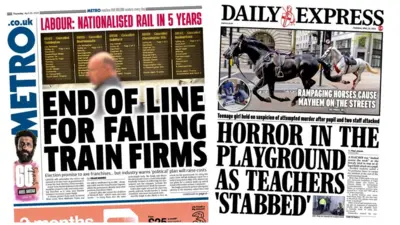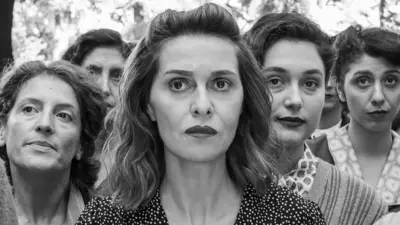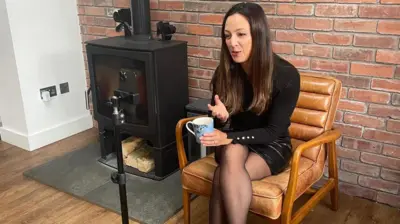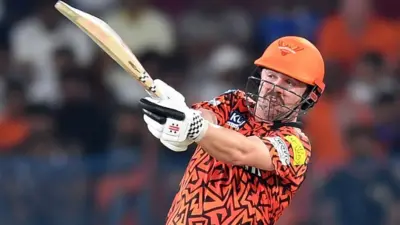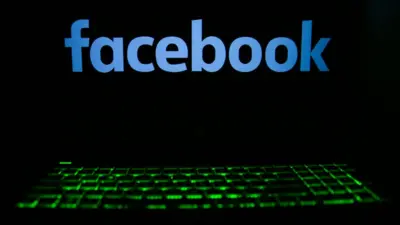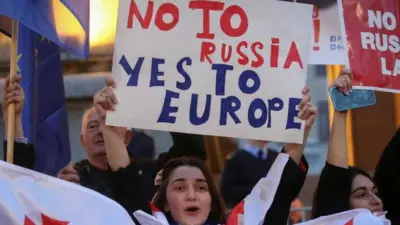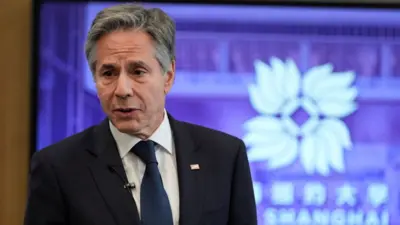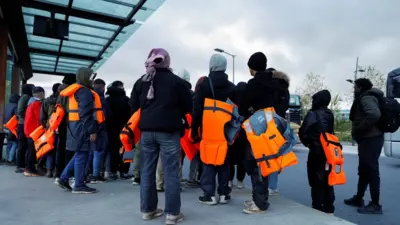We've updated our Privacy and Cookies Policy
We've made some important changes to our Privacy and Cookies Policy and we want you to know what this means for you and your data.
Strikes unfair at Christmas, Tory chairman Nadhim Zahawi says
- By Joshua Nevett
- BBC Politics
It is unfair for unions to "disrupt people's lives" with public-sector strikes at Christmas, Conservative chairman Nadhim Zahawi has said.
He said plans were in place to draft in the military to drive ambulances and secure borders if walkouts went ahead.
Mr Zahawi also told the BBC Russian President Vladimir Putin "wants to see" strikes, but unions criticised this.
Thousands of workers from various industries are set to strike this month in disputes over pay and conditions.
Some unions say pay should match the cost of living, which is increasing at its fastest rate in 40 years, largely as a result of rising food and energy prices.
Some of the most high-profile strikes have been called by unions representing workers in the NHS, the railways and the Royal Mail.
Nurses in England, Wales and Northern Ireland will strike over two days this month, in what is set to be their biggest walkout in the NHS's history.
Elsewhere, rail strikes will be held across four 48-hour periods in December and January, leaving passengers facing severe disruption to Christmas travel.
In an interview on the BBC's Sunday with Laura Kuenssberg programme, Mr Zahawi was asked what the government was doing to end the strikes.
The minister said President Putin's war in Ukraine - which has sent energy costs soaring - was the main driver of rising prices and pressure on pay.
He suggested some of the pay rises demanded would further stoke inflation - which is the increase in the price of something over time - which would "hurt the most vulnerable".
The government has repeatedly urged unions and employers to negotiate settlements and halt strike action, saying it can not afford pay rises to cover inflation.
But unions say workers have faced real-terms cuts to pay over many years and deserve a fair deal that reflects the current cost of living.
'Rethink and reflect'
When asked what the government would do to help the public deal with the impact of the strikes, Mr Zahawi said "we are operationalising contingency plans".
Those plans include training about 2,000 military personnel and civil servants to support a range of services - including the Border Force at airports and ports - in the event of strike action.
The government is also planning for the potential deployment of military personnel to roles including ambulance driving and firefighting.
"It's unfair, in my view, for the unions to really damage and disrupt people's lives and livelihoods at Christmas," Mr Zahawi told Laura Kuenssberg.
"They should rethink and reflect on this because that is exactly what Putin wants to see. Let's not divide, let's come together."
Opposition parties say the government is deflecting the blame for the strikes after refusing to give workers a fair pay rise.
"It is ludicrous and insulting to suggest Vladimir Putin is responsible for nurses going on strike," said Cabinet Office spokesperson for the Liberal Democrats, Christine Jardine.
"The responsibility lies firmly with this Conservative government's shambolic failure to find a solution."
Pat Cullen, general secretary and chief executive of the Royal College of Nursing union, said using Russia's war in Ukraine as a justification for a real-terms pay cut for nurses was "a new low for this government".
"The public does not believe this kind of rhetoric and wants ministers to address our dispute," he said.
The shadow education secretary, Bridget Phillipson, said there was a compromise to be had on teachers' pay.
The government has offered teachers pay awards of between 5% and 8.9%, depending on their position, but education workers say this is nowhere near enough to address a real-terms pay cut and the impact of inflation running at more than 10%.
Pressed on where the compromise should be reached, Ms Phillipson told the programme: "It's often somewhere in the middle and that's why it's a process of negotiation about pay but also about terms and conditions."
Ms Phillipson said important decisions were not being taken "because of the chaos that we've seen" at the heart of government this year.
Prime Minister Rishi Sunak, who took office about a month ago, is grappling with an economic crisis and a recession predicted to last at least a year.
His party's ratings in the polls have slumped well below those of Labour, whose candidate won a by-election in Chester with a large majority earlier this week.
The 13.6% swing from Conservatives to Labour in the Chester by-election would be enough for Labour to form a government if the result was replicated in a national poll.
When asked about the result, Mr Zahawi said there was "no shying away from the fact that the internal challenges of the Conservative party has probably led to the gap in the polls".
He said the party was undertaking "a rebuilding exercise" after a period of turmoil under former Prime Minister Liz Truss, who resigned over the instability caused by her mini-budget.
Top Stories
Features & Analysis
Most read
Content is not available
